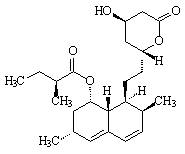Niacin for cholesterol
Is niacin a statin? No. It is chemically different from the statin drugs. Niacin (also called nictonic acid and vitamin B3) is a key nutrient in many foods. There are some cholesterol-lowering benefits at niacin . In particular, it lowers LDL levels. A quick look at the molecular structure of niacin and lovastatin (a statin medication) shows how different they are:
 |
 |
| Niacin | Lovastatin |
Strictly speaking, both nicotinaminde and nicatonic acid are sold as niacin, but it’s really nicotinic acid that is useful for lowering cholesterol. Like statin medications, niacin is thought to work by stopping the production of cholesterol by the liver. It also reduces Fibrinogen (factor I) production by the liver. Niacin also ends up raising HDL levels (the good cholesterol) by slowing the conversion of HDL to low density cholesterol.
Over-the-counter niacin supplements that are marketed as causing “no flush” might have no nicotinic acid - it might be all nicotinaminde which provides no benefit to cholesterol problems. There have been some suggestions that OTC slow-release niacin supplement formulations can lead to liver damage, jaundice, and fulminant hepatitis – this might be due not to niacin but to other materials in the supplements.
If you want to use niacin to treat dyslipidia, it appears that it can positively affect HDL levels at 1.5 grams/day, while a dose of 3 grams/day is needed to produce lower LDL levels. Unfortunately, at these doses, flushing occurs in 80 percent of patients. Some patients experience chronic itching and uncomfortable tingling sensations.
One problem that niacin supplements pose is that they increase blood
sugar levels, and can cause hyperglycemia. People with angina and
gout should also avoid niacin as it can exacerbate those conditions.
A University of Washington study showed that niacin supplements slowed atherosclerosis in people with coronary artery disease even if they were already taking statins.
The company Kos Pharmaceuticals even makes a pill called Advicor, which is a combination of niacin and lovastatin. The drug company AbbVie makes Niaspan, a prescription from of extended-release Niacin. In 2011 a government (National Heart Lung and Blood Institute) study found adding niacin to a statin regimen did not reduce the risk of heart attack. The study was ended a year and a half early.
Niacin also finds use among some people as a "smart drug" - it can allegedly improve your cognitive functions. There is little evidence about this, though.
Niacin is sold as prescription form and as vitamin pills. Dietary supplements are not regulated by the U.S. Food and Drug Administration (FDA) the same way that prescription niacin is and the amount of niacin in the pill can vary considerably. The name of niacin in the store may be nicotinic acid, Endur-Acin, Nia-Bid, Niac, Niacels, Niacor, Nico-400, Nicobid Tempules, Nicolar, Nicotinex Elixir, or Slo-Niacin.
However, it is best to check with a doctor before taking niacin along with a statin. Don't try to do it on your own. Patients should be closely monitored by their doctor to avoid complications from niacin and particularly a combination with statins.
Use of niacin supplements with a statin may increase the risk of developing muscle problems and kidney failure.
Signs and symptoms of a niacin overdose include:
- Rapid heartbeat
- Skin flushing
- Itching
- Nausea and vomiting
- Abdominal pain
- Severe liver damage (hepatoxicity)
Another drug called laropiprant can be given with niacin to reduce flushing. The combination is solf under the brand name Tredaptive. Merck marketed this combination to raise HDL, but in January 2013 recalled the drug as too many people were having bad reactions to the niacin.
Research
Seeing red: flushing out instigators of niacin-associated skin toxicity.
Effect of niacin therapy on cardiovascular outcomes in patients with coronary artery disease.
Niacin's role in the statin era.
Niacin in the prevention of atherosclerosis: Significance of vasodilatation.


